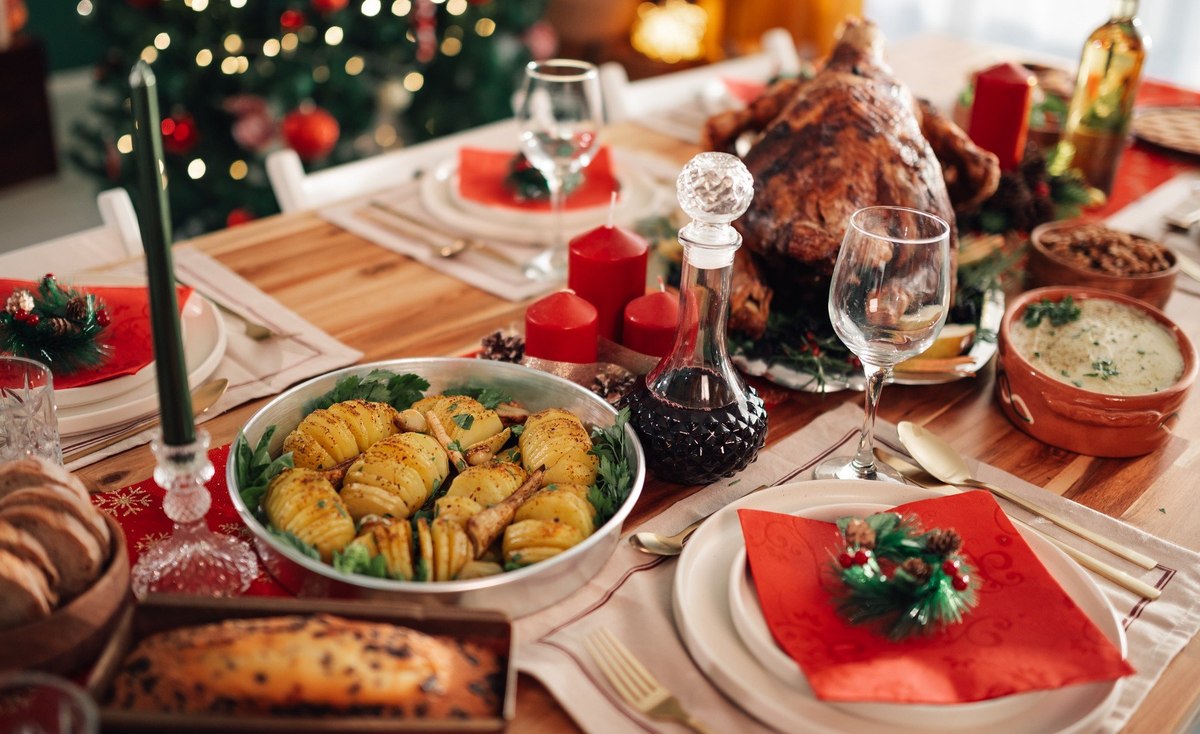Key findings:
- 78% of British adults expect to spend under £300 on Christmas food and drink, with 31% budgeting between £100 and £199.
- 27% of consumers say they are cutting back and looking for lower-cost or alternative food or drink options, while 55% are spending about the same as last year.
- 83% of respondents consider roast potatoes or vegetables essential to their Christmas meal, followed by 61% who prioritise roast meat and stuffing.
- 69% make their main dish from scratch and 77% prepare side dishes at home, but 62% buy desserts ready-made.
- 47% plan to splurge on the main dish, while 40% are saving on desserts and 43% are cutting back on snacks and sweets.
With household budgets still under pressure, many British consumers are heading into the festive season looking for ways to celebrate without overspending. A new YouGov Surveys: Self-serve poll reveals how people across the country are adjusting their approach to Christmas food shopping — balancing financial caution with a desire to keep key traditions intact.
From scratch-cooked mains to scaled-back drink purchases, the data highlights how British households are navigating Christmas in 2025.
Spending is capped, but the meal is non-negotiable
The majority of British adults expect to spend conservatively on Christmas food and drink this year. Nearly one-third (31%) are budgeting between £100 and £199, with another 20% keeping within the £200–£299 range. Around one in four (27%) say they’ll spend less than £100. A minority (4%) anticipate spending more than £500.
Around 6% say they’re spending more this year, while 55% are holding steady. One in four (27%) are cutting back and actively looking for lower-cost or alternative options.
Core dishes still anchor the Christmas table
Despite tighter budgets, the centrepiece of the meal is unchanged. Roast potatoes or vegetables are considered essential by 83% of respondents — more than any other item. Roast meats and stuffing are each named by 61%, and over half (54%) still consider Christmas pudding or similar desserts a must-have.
Alcoholic drinks are selected as essential by 47% of respondents, while fewer consider chocolates (36%) or non-alcoholic festive drinks (32%) critical to their meal.
Scratch cooking is up, especially for mains and sides
Shoppers are possibly meeting rising costs with more effort in the kitchen. For main dishes like roast, 69% of respondents say they usually make them from scratch, and 77% say the same for side dishes. In contrast, only 24% make desserts like Christmas pudding or mince pies themselves, and just 17% prepare appetisers or snacks at home. Drinks are the most likely to be skipped (37%) or store-bought altogether (37%).
This suggests that consumers spend more time, not more money choosing scratch-cooked meals over convenience foods.
Splurging is reserved for the main meal not the extras
Where shoppers are spending more, it’s focused on the centre of the plate. Nearly half (47%) expect to splurge on the main dish, compared to 27% who say they’ll save in that category. For side dishes, opinions are more evenly split — 38% plan to splurge, while 39% are looking to save.
Beyond that, spending drops off, comparatively. A quarter (25%) expect to splurge on desserts or snacks, and13% plan to spend more on non-alcoholic drinks. A full third of respondents say they won’t buy soft drinks or mocktails at all (33%), and 30% say the same for alcohol.
A redefined Christmas strategy for retailers
Britain’s 2025 holiday food shoppers are redefining how they approach it. Consumers are holding on to what matters most and cutting back on what doesn’t. For brands and retailers, that means shifting focus from indulgence to practicality.
Methodology: YouGov polled 713 British adults online on November 11, 2025. The survey was carried out through YouGov Surveys: Self-serve. Data is weighted by age, gender, race, political affiliation, education level and region.
Image: Getty Images
